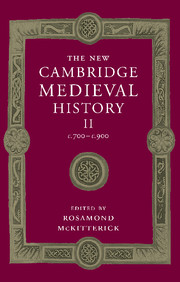Book contents
- Frontmatter
- PART I POLITICAL DEVELOPMENT
- 1 Introduction: sources and interpretation
- 2 The British Isles
- 3 Frankish Gaul to 814
- 4 The Frankish kingdoms, 814–898: the West
- 5 The Frankish Kingdoms, 817–911: the East and Middle Kingdoms
- 6 Fines Imperii: the Marches
- 7 The Vikings in Francia and Anglo-Saxon England to 911
- 8 Scandinavia, c. 700–1066
- 9 Slavs and Bulgars
- 10 The Muslims in Europe
- 11 Spain: the northern kingdoms and the Basques, 711–910
- 12 Lombard and Carolingian Italy
- 13 Byzantine Italy, c. 680–c. 876
- 14 Byzantium and the west, 700–900
- PART II GOVERNMENT AND INSTITUTIONS
- PART III CHURCH AND SOCIETY
- PART IV CULTURE AND INTELLECTUAL DEVELOPMENTS
- Conclusion
- Appendix genealogical tables
- List of primary sources
- Bibliography of secondary works arranged by chapter
- Index of manuscripts
- General index
- Frontispiece">
- Plate section
- Map 4 Charlemagne’s Europe and Byzantium, 814
- Map 19 The ecclesiastical provinces of western Europe 700-900
- Map 20 Carolingian schools, scriptoria and literary centres
- Genealogical table X: Wessex
- References
14 - Byzantium and the west, 700–900
from PART I - POLITICAL DEVELOPMENT
Published online by Cambridge University Press: 28 March 2008
- Frontmatter
- PART I POLITICAL DEVELOPMENT
- 1 Introduction: sources and interpretation
- 2 The British Isles
- 3 Frankish Gaul to 814
- 4 The Frankish kingdoms, 814–898: the West
- 5 The Frankish Kingdoms, 817–911: the East and Middle Kingdoms
- 6 Fines Imperii: the Marches
- 7 The Vikings in Francia and Anglo-Saxon England to 911
- 8 Scandinavia, c. 700–1066
- 9 Slavs and Bulgars
- 10 The Muslims in Europe
- 11 Spain: the northern kingdoms and the Basques, 711–910
- 12 Lombard and Carolingian Italy
- 13 Byzantine Italy, c. 680–c. 876
- 14 Byzantium and the west, 700–900
- PART II GOVERNMENT AND INSTITUTIONS
- PART III CHURCH AND SOCIETY
- PART IV CULTURE AND INTELLECTUAL DEVELOPMENTS
- Conclusion
- Appendix genealogical tables
- List of primary sources
- Bibliography of secondary works arranged by chapter
- Index of manuscripts
- General index
- Frontispiece">
- Plate section
- Map 4 Charlemagne’s Europe and Byzantium, 814
- Map 19 The ecclesiastical provinces of western Europe 700-900
- Map 20 Carolingian schools, scriptoria and literary centres
- Genealogical table X: Wessex
- References
Summary
the early medieval societies of Byzantium and western Europe that emerged from the late Roman world shared more than a few institutions, traditions and religious experiences. They sometimes rubbed shoulders in ways we overlook. Rome’s clerical elite was so hellenised that the pope who reigned at Charlemagne’s birth spoke Greek as his mother tongue. Under Charlemagne’s grandsons, the entourage of St Methodius, who was born in Thessalonica, was once an imperial official in Macedonia and was later a monk in Bithynia, used Greek majuscules in the memorial book of a German monastery to record their stay. Conversely, Franks served in the Byzantine emperor’s military household and figured at palace banquets.
Facts like these raise the broader question of how the two main entities of Christendom interacted over the six or seven generations from c. 700 to c. 900. The historical problem is not without snares. ‘Influence’ can be misleading: interaction between cultures rarely has one society passively undergoing the active influence of another. Once something is available, the borrowing civilisation must take the initiative in appropriating it from the other culture. So when, where and how Byzantium and the west came into direct or indirect contact needs clarifying. Moreover, though these early medieval societies evolved away from their late antique roots, those common roots are everywhere discernible, and it is easy to mistake residual for recent borrowing. Even over seven generations, patterns of interaction changed. And Byzantium took as well as gave.
Keywords
- Type
- Chapter
- Information
- The New Cambridge Medieval History , pp. 349 - 380Publisher: Cambridge University PressPrint publication year: 1995
References
- 2
- Cited by

